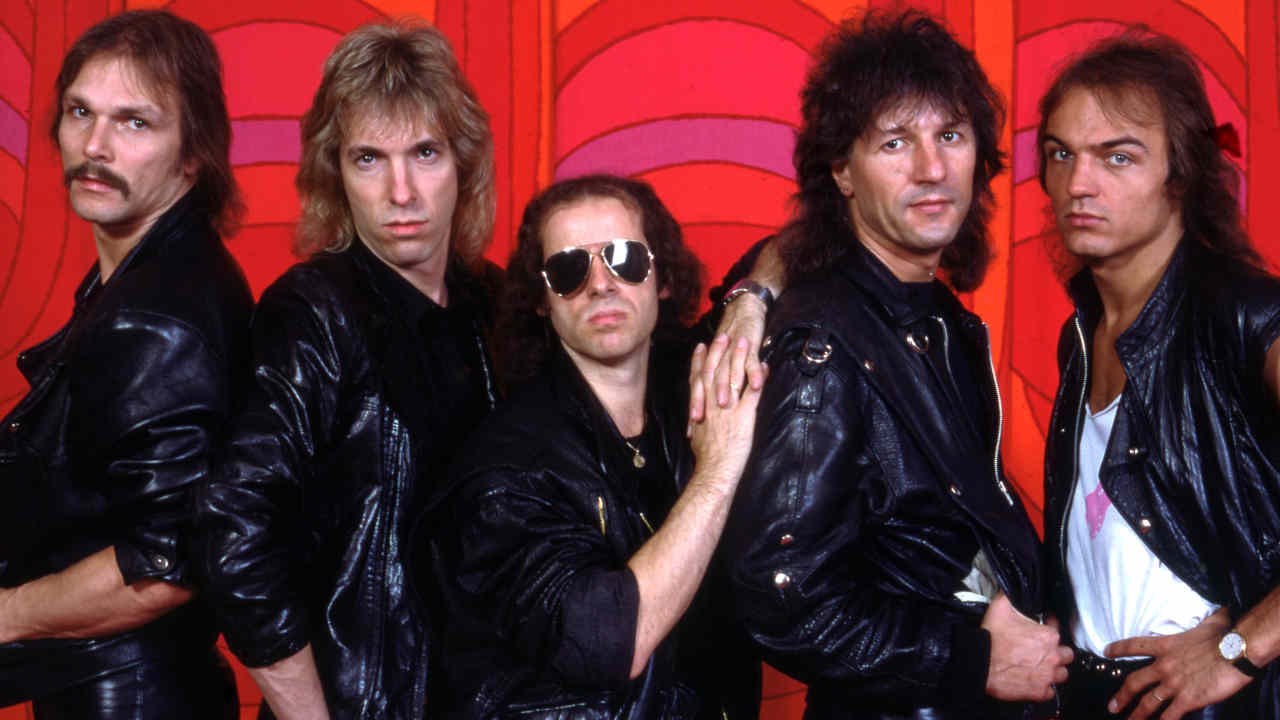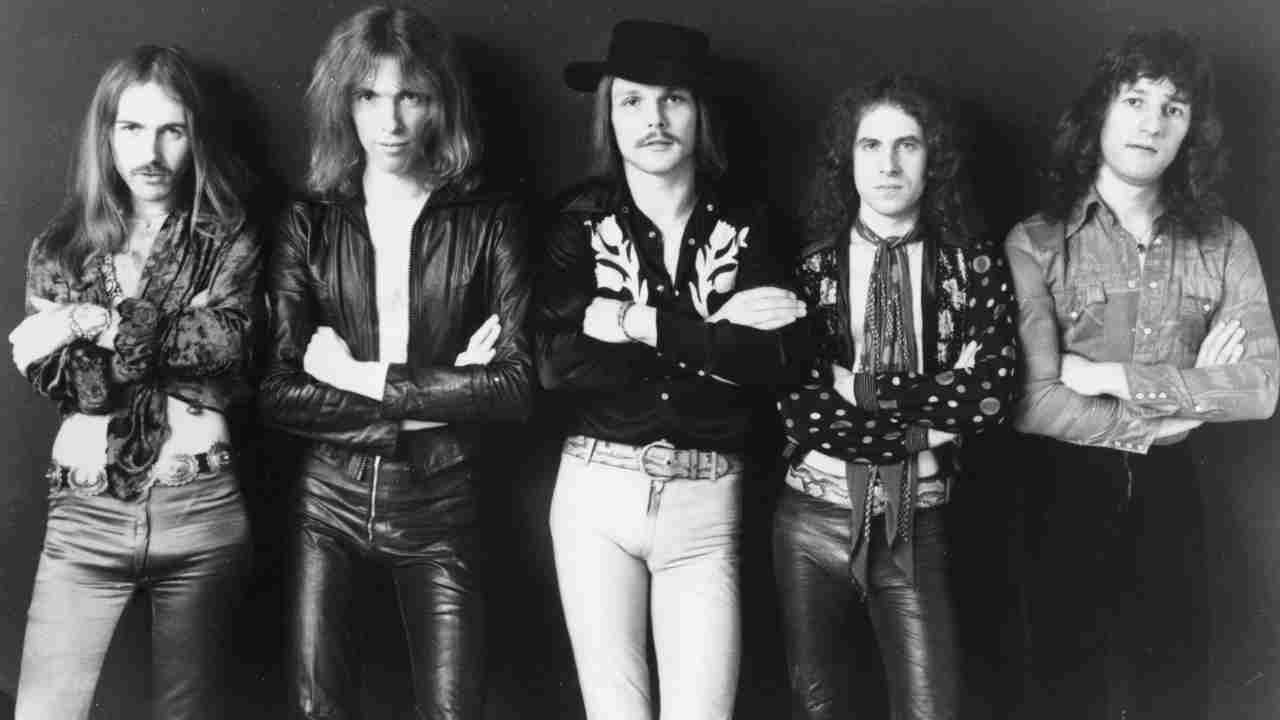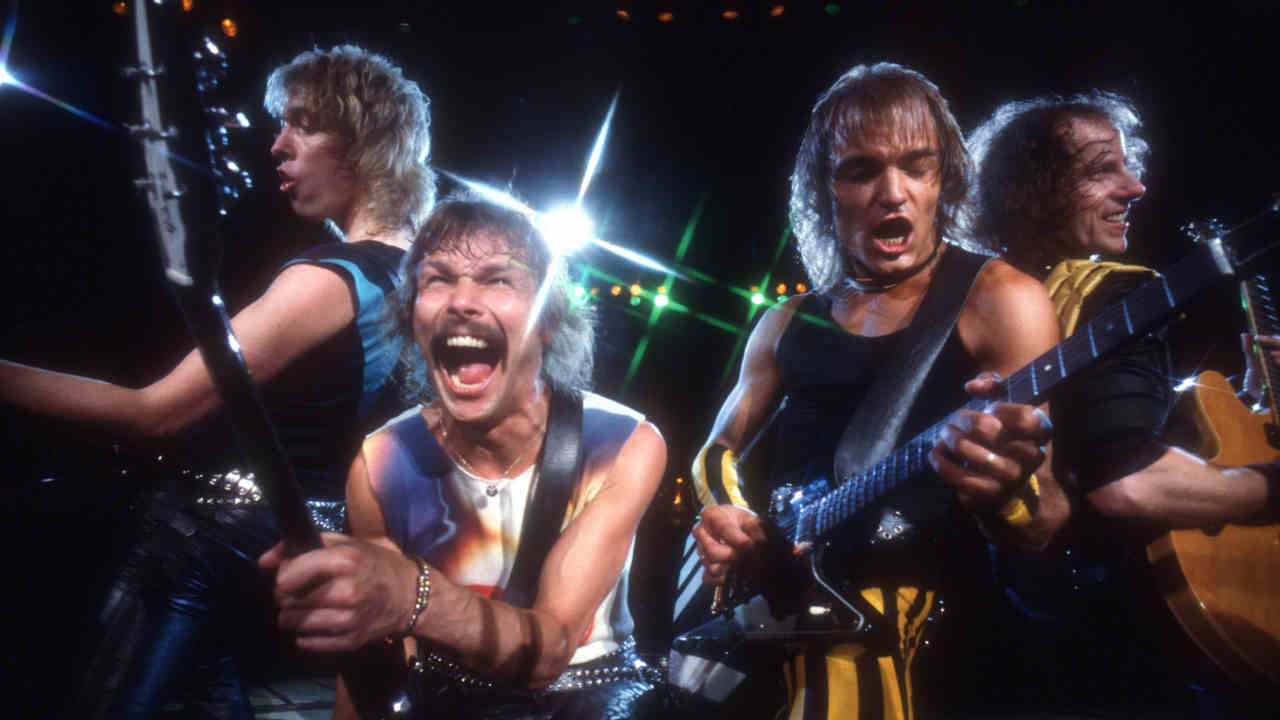
Formed in Germany in 1965, few metal bands can match the Scorpions for longevity. In 2015, as they celebrated their 50th anniversary, founder and guitarist Rudolf Schenker, singer Klaus Meine and guitarist Matthias Jabs looked back on becoming the first globally successful German rock band, the hedonistic days of the 80s and their alleged ‘retirement’…
It happened purely by chance – the moment that Rudolf Schenker realised his band would reach a significant milestone in 2015. Scorpions’ founding member and rhythm guitarist was at his home in Germany early last year when he found in his guitar room a box of documents from the 1960s. Inside was a receipt for the band’s very first paid gig. It was dated October 1965. Schenker immediately called each of his bandmates and told them: “Guys, what we have now is fifty years of Scorpions. We’ve got to do something.”
Rudolf is the sole remaining member of those early years – singer Klaus Meine didn’t join until 1970 - but the guitarist’s enthusiasm remains undimmed. In 2010, the band announced they would be embarking on a farewell tour, which has subsequently turned into one of the longest goodbyes in the history of rock’n’roll.
Scorpions have sold more than 100 million records and made some of the defining hard-rock albums of the 70s and 80s. After all that they have achieved together, it is hard for Schenker, Meine and Jabs to let go – for Schenker especially, whose entire adult life has been dedicated to the band. But when they look back over their career, and to what the future might hold, there is no sadness in what they say. Quite the opposite. “We’re celebrating fifty years of Scorpions rock’n’roll,” Schenker declares loudly. “Back in 1965, I would never have believed it was possible.”

After fifty years, this band is still standing. What’s the key to its longevity?
Klaus Meine: Most of all it means that our friendship survived all those years. Friendship is the foundation for the band. And it’s why we’ve been able to carry on doing what we love most – playing music, writing songs. That’s fantastic.
Rudolf Schenker: From the very beginning, I wanted the right chemistry – it’s very important that you have friendship in the band. When I founded the band, I said: “Look, we don’t have a boss here. We are a democracy.” This was a very important point. Keep the band as close as possible.
Come on, Rudolf. You started the band – you give the orders!
Schenker: Ha ha! No comment!
Matthias Jabs: Rudolf is the driving force. He has enormous energy.
Meine: I think Rudolf was the boss, and in certain ways he still is. In the early years he always had the strongest motivation. He was always pushing forward, always believing there is a new adventure around the next corner. He’s still like that now.
Back in 1965, was there a German rock’n’roll band that inspired you?
Schenker: There was one band, The Rattles. They were good friends of The Beatles. They played at the Star Club in Hamburg where The Beatles played. They also had the chance to play with The Beatles in America, but to finance that tour they needed two hundred and fifty thousand German marks. Instead they bought four Ford Mustangs with the money. That was a big mistake.

What are your fondest memories of Scorpions’ earliest days?
Meine: Every penny was spent on the band. I used to smoke, and one time when we pulled in at a truck stop and I wanted to buy some cigarettes, Rudolf said: “Klaus, you got to stop smoking. We need the money for the gas.” He wasn’t worried about my voice or my health [laughs].
Schenker: When we had enough money I bought a Mercedes 300 SEL, and we all toured in this car. We were driving six, seven hours, sometimes more, and there was a lot of time to talk, to listen to music, to think about how we can make the show more outstanding – talking and talking until there was one idea that was unbeatable. That was good for us.
Did you always believe you would make it big?
Schenker: We believed in what we were doing. But in the early seventies, all the big German bands – Can, Amon Düül, Kratftwerk – were playing this experimental music. And we were playing English and American rock music. The German magazines laughed at us.
And the British press took the piss because you were German.
Schenker: Oh yes. We played in 1975 at the Marquee club in London, which was a very important step for us – a young German rock band, singing in English, standing on that legendary stage where the Rolling Stones and Jimi Hendrix and everybody used to play. And the British press said: “Blitzkrieg!” All this shit about the war.
That must have hurt.
Schenker: Of course it affected us, but we understood it was the British sense of humour. And we wanted to show that here was a new generation from Germany. We’re coming not with tanks but with guitars. We felt that we were building bridges between countries and generations. For us it was very important that we could change people’s minds.
You made some great records in the 70s with lead guitarist Uli Jon Roth, but he was so obsessed with Jimi Hendrix, it made the band sound rather schizophrenic.
Meine: Uli was one hell of a player, but he was on a totally different trip to Rudolf and myself. With his style and our style being so different, it would never have worked in America, and we could feel it.
Rudolf: Uli was the one who said: “I gotta go, I have to follow my own musical visions.” So it was a friendly departure. And when Matthias joined the band, we became more of a unit. We were much stronger.
Was Lovedrive in 1979 the album on which the band really defined its sound?
Schenker: It was a real breakthrough. That was when I thought, “Now we have it.” This album had the true Scorpions style, from the first song to the last. And this was the album that broke through internationally, including America.
Was that always the ultimate goal – to make it big in America?
Schenker: Absolutely. Around 1977, when Michael [Schenker, Rudolf’s younger brother and original Scorpions guitarist] was in UFO, he called me from Los Angeles and said: “Why are you guys not playing in America?” He told me about this band called Van Halen that he’d seen playing in a club. And they were playing Scorpions songs – Speedy’s Coming and Catch Your Train. I said: “What? I’m coming over!”
So you had a cult following in America before you played there?
Schenker: This is a good story. My first time in Los Angeles, I remember sitting with Ritchie Blackmore in the Rainbow bar one night. Ritchie liked us very much, and he took me to a big party. We entered the place, and the people went: “Oh my God!” I thought the reaction was for Ritchie, but it was for me [laughs]. They were crazy for Scorpions. Then I realised: this is the country for us.
Lovedrive also had a brilliant cover by Hipgnosis: a man groping a woman in a limo, his hand coming away from her breast in flesh-like strands of pink bubblegum.
Schenker: That cover is fun, it’s sexy – totally rock’n’roll.
Meine: We loved Hipgnosis. [Designer] Storm Thorgerson was such a crazy guy and so brilliant. And we even had the legendary [photographer] Helmut Newton doing the cover for Love At First Sting.
Schenker: We also had the chance to work with Andy Warhol. This was in 1988, for the Savage Amusement album. He wanted seventy-five thousand dollars to do the cover. That was no problem for us. But he would not allow us to use the artwork for merchandise. That’s when we said no. Looking back, it was a mistake not working with him.
Meine: And of course there are some covers we’re not so proud of…
You mean the notorious cover for 1976’s Virgin Killer album, which featured a photograph of a naked pre-pubescent girl beneath a pane of glass shattered over her crotch?
Meine: In those days there were covers with images of young girls, like Led Zeppelin’s Houses Of The Holy. It was not thought of as pornography. It was just an expression of art. It was supposed to be edgy. But it was not the kind of cover that we would proudly show to our folks back home. No way. It is not tasteful. It is wrong, and we shouldn’t have done it.
You’ve also written some decidedly non-PC lyrics over the years.
Schenker: Yes. The lyrics for Rock You Like A Hurricane: ‘The bitch is hungry/She needs to tell/So give her inches and feed her well.’ But girls always say they love that song. It’s instinct. It’s rock’n’roll.
What about sex and drugs?
Meine: Touring America in the 80s was like a never-ending party. We had lots of fun.
Jabs: These were the days before AIDS was known – a fantastic time, to be honest. There would be long lines of groupies at our dressing room door. But I was married then, unfortunately. We were all married apart from Herman [Rarebell, drummer]. All the wives wanted to come on tour, but people said: “Why are you bringing your wives? It’s like taking sand to the beach.” With all that temptation around, it was not easy.
And drugs?
Schenker: Of course! In the eighties you ordered a gram of cocaine like you ordered a beer. Doing cocaine was normal in those days. But we never did it in the way that Mick Fleetwood did it. We never had a drug problem.

What was the absolute high point of Scorpions’ career?
Meine: The eighties belonged to us.
Schenker: It was just a great time for hard rock in the eighties. There was so much energy and it was so inspiring. And for Scorpions, the Us Festival [a huge 1983 event held in California] was the peak. We played before Van Halen and they did not allow us to have any special effects on stage. And so we thought, maybe we will find something even better. For the opening of the show we had five fighter jets flying over the stage and out over the audience. A lot of people said the we stole the show. That was what broke us big time in America.
Jabs: The next year, eighty-four, we sold out Madison Square Garden three times in a row. I brought my parents over to New York City to see the shows. It was the first time my mother had been on a flight – my father, due to the war, had been in planes. This was the time when I knew I’d made the right decision in my life. But of course, my mother said: “So, when do you want to do something sensible?” That’s how mothers are.
What was your lowest point?
Schenker: Klaus lost his voice when were making the Blackout album. He went through hell.
Meine: Through the seventies I was singing every show like there was no tomorrow, always pushing so hard, until my vocal cords couldn’t take it any more. I had surgery twice, and after that second surgery it was really hard. That was the moment when I thought it was impossible for me to sing that album.
What kept you going when you thought you would never sing again?
Meine: It was a sad, sad time for me. I was about to give up and tell Rudolf: “You should look for a new singer.” But he said to me: “Come on, Klaus! You have to fight, and then you will get your voice back!” That was a great act of friendship.
The band went through some lean years in the nineties. Did you think about splitting up then?
Meine: At the end of the nineties we were empty. After all those years of alternative music, we didn’t know if we had any fans left. When we made the Eye II Eye album in ninety-nine we lost our direction completely. We were close to splitting up.
Jabs: With Eye II Eye, everybody was saying classic rock was dead. We were stupid enough to believe that. The fans said: “This is not our Scorpions.” In fact, Eye II Eye was the best mistake we ever made. We realised we have to do what we do best.
Schenker: When alternative music came in, we had to be smart. There was no interest in America and Europe, so we went to Asia. We played in stadiums. In Thailand we had an album twenty times platinum – more than Michael Jackson. Korea, Malaysia – this was our market in those days.
How do you measure your popularity now?
Schenker: We have six million Facebook fans – and eighty per cent of them are between eighteen and twenty-eight years old. A complete new generation.
Meine: Believe it or not, we just reached the hundred million views mark on Vevo for the video for Wind Of Change.
It’s your whistling that makes that song.
Meine: Well, when I wrote the song, I just whistled because I needed a melody and I’m not a guitar player. We tried recording some cool guitar parts but it just didn’t work as well as the whistling. I just hope I will be remembered more for being a great singer than a great whistler [laughs].
The song We Built This House on your new album is like a history of Scorpions.
Meine: Yes. Even though it’s a love song, all of us feel it’s a strong statement. Scorpions was built by us, brick by brick, and the house is still standing.
Did your marriages survive?
Jabs: I’m married now for the second time.
Schenker: I was married for thirty-eight years, but I’m living now with my girlfriend who I found in Siberia eleven years ago. We had a beauty contest at every concert on that tour in Russia, so this is how we met.
Meine: I have managed to still be together with Gaby. We got married in seventy-seven. She was with me through all the good and bad times. And we still enjoy life together. We made it through this crazy rock’n’roll circus and it worked out.
Any regrets about ending the band?
Meine: In 2010, when we announced the farewell tour, we were burned out. We thought: “Okay, one last great tour, this is a good moment to leave.” Maybe it was the right decision. But maybe the wrong decision, because when were making this new album, we realised that there’s still a lot of creativity in the band. A lot of gas in the tank.
Schenker: The farewell tour really kicked our ass. We had a creative jump – writing new material. We were amazed to see how many young fans we have. And these fans, they don’t want to let us go.
So how long can you continue?
Meine: From Ozzy to Motörhead to AC/DC to Scorpions, all of us are moving forward but not knowing what life will bring. It’s amazing that the Stones are still out there rocking. I saw them last year in Berlin with Steven Tyler. I said: “Steven, look at Jagger – he’s seventy-one!” Steven said: “Klaus, I’m sixty-six!” I said: “Yeah, so am I!” But we’re still here. And if we have two more years, that’s fine with me.
Originally published in Classic Rock issue 207







